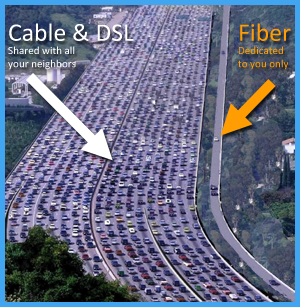High Speed Internet Explained
Redundant High Speed Internet
Are You Taking Advantage of the Fastest Internet Speeds Available?
Ever since the 90’s, the term ‘high-speed Internet’ has had many different meanings. We typically still call it Broadband, but high-speed Internet is offered in six different services:
- DSL (Digital Subscriber Line)
- Satellite Internet
- LTE Wireless
- Fixed Wireless
- Cable Internet
- Fiber-optic Internet
Metropark offers your business ALL OF THE ABOVE Internet options. Most businesses understand that no Internet is 100% dependable, so we typically recommend and deploy two or more internet providers to create a fully redundant Internet connection for your business. As a vendor consolidation provider, Metropark has all the best services, solutions, and prices!
The Evolution of High-Speed Internet
In its early days, High-speed Internet — by definition — had a speed of 512 kilobits per second (Kbps) or higher, although the idea of fast Internet was relative. Just a few decades ago, dial-up was the only Internet service offered to most small businesses with the fastest connection possible being 56 Kbps or 64 Kbps as an ISDN Line. Back then, speeds more than 1 megabit per second (Mbps) were only attainable with a T1 (1.544Mbps). Eventually, broadband — a.k.a. high-speed Internet — was introduced to small businesses and homes.
At the time, the FCC (Federal Communications Commission) considered broadband speed to be 4Mbps download and 1Mbps upload. DSL brought faster speeds to urban areas, while satellite Internet provided rural and remote homes and businesses with broadband downloads. Cable eventually offered speeds faster than both DSL and satellite Internet. However, the copper wires of cable Internet have always had their disadvantages.
A Need for Even Faster Internet
Until a few years ago, cable was considered the fastest Internet, with DSL (U-verse) a close second. The greatest problem with cable is inconsistent speeds. Many people log on during peak Internet hours – when neighbors are also online streaming content, uploading photos, etc. – and thus experience slower speeds. The reason for the slowdown is that cable subscribers share a connection with hundreds of others, so speeds are compromised.

Today, Internet users are using more bandwidth than ever before – for video chatting, streaming content, TV shows, VoIP, online gaming and more. Within just the next few years, copper cables won’t be able to support this heavy use. In fact, in many municipalities, critical mass has already been reached. Some of the big Internet Providers are hopeful that 4G LTE or 5G will be able to compete in the high-speed broadband arena to offload much of the heavy usage. The FCC considers Broadband speeds today as 25Mbps download and 3Mbps upload. Check out the current Broadband Speed Guide from the FCC.
What Defines Fast Internet Today?
In today’s technologically advanced world, fiber-optic Internet is considered the fastest form of Internet available. It far surpasses the 25/3Mbps requirement for ‘high-speed Internet’ classification. In most cases, we can install non-shared Fiber Internet to your business with speeds from 5mb to 1,000 Mbps…that’s 1 Gigabit — crazy FAST!!
Unlike copper cables, fiber-optic Internet transmits data through pulses of light – allowing it to move greater amounts of data farther distances in less time. Additionally, since the fiber is brought directly to your place of business, you don’t share your connection with neighbors, so your speed will not be comprised. We call this Dedicated Internet.
Expectations of Internet Speeds are Constantly Evolving
Internet speeds have increased from 56 Kbps to 1,000 Mbps (1,000,000 Kbps) in just a few decades and it will likely not stop there. As companies begin to explore the potential of greater than 1 gigabit per second Internet speeds, people’s expectations of what is considered fast Internet will begin to shift again. In fact, the FCC is already considering increasing the lower limit for what is considered broadband Internet which indicates perceptions are beginning to shift again with regards to high-speed Internet and its definition of ‘fast’.